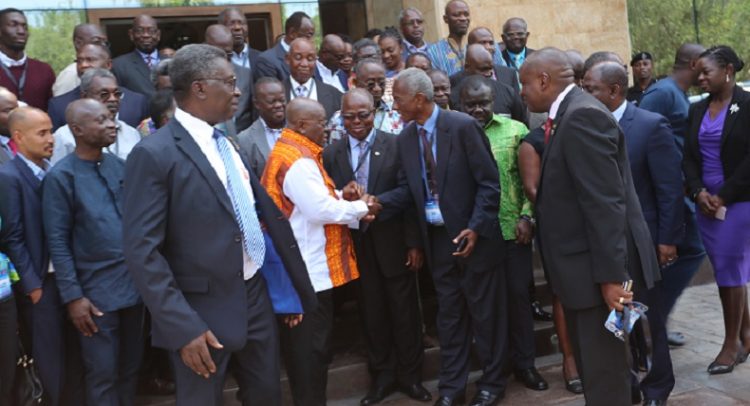President Akufo-Addo exchanging pleasantries with Kwame Pianim (2nd right), an economist, while Prof. Frimpong Boateng (left), Kwabena Agyapong and others look on.
President Akufo-Addo says the country can no longer fashion its developmental policies on aid and dependency.
He believes over-dependence on foreign assistance has not worked and would not work for Ghana as a country.
“It’s important to state that we can no longer continue to make policies for our country on the basis of whatever support the technologically advanced world can give us. It has not worked and it will not work,” he said at a conference, which was themed, “Bridging the Technology Gap Towards Ghana Beyond Aid’ and Youth Employment.”
He said the time has come for Ghana to develop policies that would make the country self-reliant, less dependent on foreign capital, technology and influence in line with the vision of building a ‘Ghana Beyond Aid’ for a strong, robust economy capable of generating a dignified and prosperous existence for its people to banish the sceptre of poverty.
That, he said, was part of reasons why his administration, through the Ministry of Environment, Science, Technology and Innovation, has developed a Science and Technology Framework that has seven pillars.
He was hopeful that the move would bridge the technology gap between Ghana and the rest of the world.
Under the scheme, he indicated that science, technology and innovation would receive constant attention from government.
The President, therefore, established a Presidential Advisory on Science Technology and Innovation (PASTI) to advise him on matters related to science, technology and innovation.
The second pillar has to do with coordination of all sectoral activities involving science, technology and innovation through an inter-ministerial coordinating council on Science, Technology and Innovation, he added.
The third pillar, according to the President, is the recognition of strong partnership between government, public research institutions, scientific academic community and industry.
He revealed that the fourth pillar is aimed at raising funding for research and development to a significant level.
Thus, a minimum of 1% of Ghana’s GDP would be applied to research and development in the short to medium term and increased to 2.5% in the long term. The fifth pillar is to target a more literate society through education.”
President of the Ghana Institution of Engineers, Steve Amoaning-Yankson, in his welcome address, stated that foreign expertise should not be used to offer technological solutions if Ghanaians locally can be utilized in order to bridge the gap between Ghana and the rest of the world in terms of technology.
By Charles Takyi-Boadu, Presidential Correspondent

